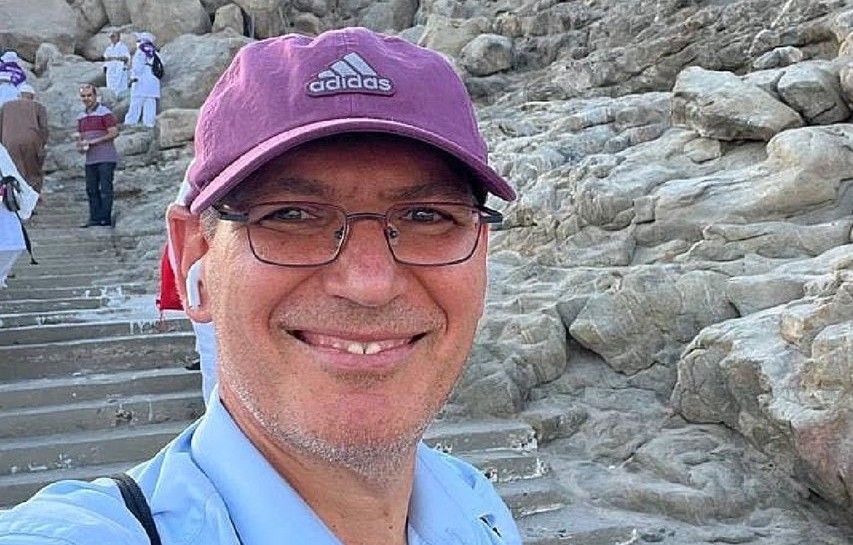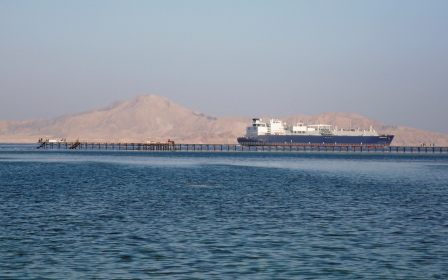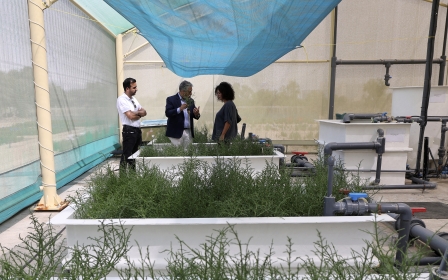Israeli journalist sneaks into Mecca, defying non-Muslim entry ban

An Israeli journalist has broadcasted footage from Mecca in Saudi Arabia, defying a long-standing ban on the entrance of non-Muslims to Islam's holiest city.
Israel’s Channel 13 aired a report on Monday featuring its world news editor Gil Tamari driving around the holy city and pointing out significant sights and landmarks.
Tamari drove past the arched Mecca Gate, which marks the entrance to the city and the point at which non-Muslims are prohibited from entering, and the Grand Mosque, the most important site in Islam.
He also took a selfie on Mount Arafat - the hill on the outskirts of Mecca where the Prophet Muhammad delivered his final sermon, a site where Muslims gather during the annual Hajj pilgrimage.
New MEE newsletter: Jerusalem Dispatch
Sign up to get the latest insights and analysis on Israel-Palestine, alongside Turkey Unpacked and other MEE newsletters
There is a total ban on non-Muslims entering Mecca and parts of the holy city of Medina. Attempting to enter can result in penalties, including fines or deportation.
Tamari was among three Israeli reporters who had been allowed into Saudi Arabia to cover the regional conference last week attended by US President Joe Biden.
'Disgusting'
The visit has been heavily criticised online, with the hashtag “Jew in the Haram” used by several Muslim social media users.
“Noble people of Makkah and great scholars like [detained Islamic scholar] Dr Musa al-Sharif are in Saudi jails, but a Zionist Jew is roaming around in Makkah,” tweeted one user.
The covert visit was condemned by pro-Israeli voices, including Saudi blogger Mohammed Saud, who has visited Israel and supports normalisation between Tel Aviv and Arab states.
“My dear friends in Israel, one of your reporters entered the holy Muslim city of Mecca and filmed without any shame,” Saud said during a video address in fluent Hebrew.
“That’s like me entering a synagogue and reading the Torah. Shame on you Channel 13, you should be ashamed of disrespecting Islam like that.”
Several Israelis criticised Tamari too, describing him as “disgusting” and calling on Israel to turn him over to the Saudi authorities.
'Sorry if anyone was offended'
Channel 13 offered an apology “if anyone was offended” but stood by its report.
“The visit of our world news editor Gil Tamari to Mecca is an important journalistic accomplishment, which was not meant to offend Muslims,” it said in a statement.
“We apologise if anyone was offended. To clarify: journalistic curiosity is the very soul of the journalist profession. The principles of journalism are rooted in reaching any location and documenting events firsthand."
On Tuesday, Tamari apologised on social media, stating that the purpose of the video was “to showcase the importance of Mecca and the beauty”.
“Inquisitiveness is at the heart and centre of journalism, and this type of first-hand journalistic encounter is what separates good journalism from great journalism,” he claimed.
The visit follows Biden’s first trip to the Middle East as president, in which he visited both Israel, the occupied territories and Saudi Arabia. He became the first US leader to fly directly from Tel Aviv to the Saudi city of Jeddah.
Biden said that his administration was working to “deepen and expand” Israeli normalisation with Arab countries, following the administration of Donald Trump's brokering of normalisation agreements between Israel and four Arab countries - the United Arab Emirates, Bahrain, Sudan and Morocco.
Although Riyadh does not officially recognise Israel, ties between the two countries have been warming in recent years and diplomacy has frequently been conducted in secret.
Middle East Eye delivers independent and unrivalled coverage and analysis of the Middle East, North Africa and beyond. To learn more about republishing this content and the associated fees, please fill out this form. More about MEE can be found here.




